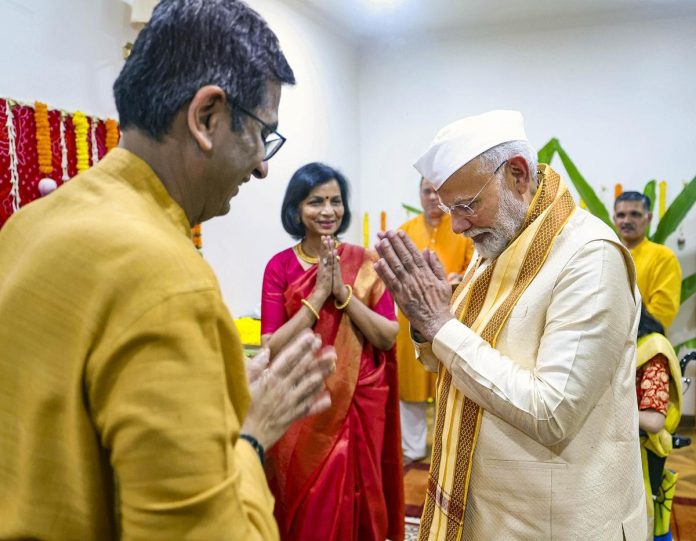Two recent events have sparked widespread discussion across political, legal, and intellectual circles: Prime Minister Narendra Modi’s visit to Chief Justice of India D.Y. Chandrachud’s residence for a Ganapati Puja, and the participation of around 30 retired judges at a Vishwa Hindu Parishad (VHP) event.
While PM Modi’s presence at the CJI’s home has garnered considerable media and legal attention, the attendance of retired judges at the VHP function, held on September 8, has been comparatively overlooked. Notable attendees included former Supreme Court judges Justice Adarsh Kumar Goel and Justice Hemant Gupta. The VHP gathering focused on issues like religious conversions and ongoing legal disputes involving the mosques in Varanasi and Mathura, which some Hindu groups claim as temple sites.
Justice Hemant Gupta, who retired in 2022, confirmed his presence but clarified that he did not deliver a speech. He defended his right as a citizen to attend lawful functions. Justice Goel, who previously chaired the National Green Tribunal, was also in attendance. Other prominent figures included Law Minister Arjun Ram Meghwal and VHP President Alok Kumar.
Critics argue that these events blur the lines between the judiciary and political or religious influences. Opposition leaders and legal experts, including former judges, have voiced concerns over the potential impact on public perception of judicial impartiality.
Former Chief Justice of India R.M. Lodha expressed concern about the separation of powers, stating, “There is a constitutional separation of power, and normally, a certain distance is to be maintained between the judiciary and the executive.”
Lodha emphasized that while such meetings may not directly influence judicial decisions, they could shape public opinion about the judiciary’s neutrality.
Similarly, Rajya Sabha MP and Supreme Court Bar Association President Kapil Sibal criticized the optics of the Prime Minister attending a private religious event at the CJI’s residence. He remarked, “This may send the wrong signal… This is not the right time for the Prime Minister to have made a public spectacle of a private ceremony.”
Former Allahabad High Court Chief Justice Govind Mathur also raised concerns, stating that while he did not believe the visit would influence the CJI’s judgments, it could tarnish his public image. Several political leaders, including Shiv Sena (UBT) leader Sanjay Raut and RJD MP Manoj Jha, also criticized the event, highlighting its potential impact on public trust in the judiciary.
In an op-ed for The Indian Express, senior advocate Indira Jaising questioned whether the public display of religious faith by the CJI and PM breached the secular nature of their oaths of office. She raised concerns about the possible erosion of judicial impartiality, particularly in cases related to the political landscape of Maharashtra. Jaising noted that this was the first instance in India’s history where a sitting CJI had invited a sitting PM to a religious event, sparking questions about the infusion of religion into judicial matters.
Journalist Ravish Kumar, in a video vlog, pointed out the symbolic and potentially dangerous implications of such an event. He drew parallels between this incident and previous interactions between PM Modi and the judiciary, suggesting that such public displays could erode the separation of powers.
The debate surrounding these events highlights broader concerns about the influence of political and religious forces on India’s judicial system. As these discussions continue, questions about the independence and impartiality of the judiciary remain central to the ongoing national discourse.




